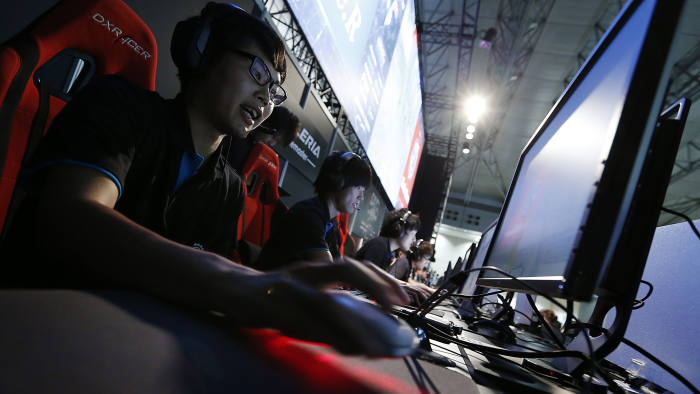It is 11am on the first day of term and the second years will soon be blearily rolling on to the Nishikasai campus after an all-night video game binge. It is hard to imagine students more fiercely devoted to the rigours of modern academia.
新学期第一天上午11点,二年级的学生在玩了一个通宵的电玩后,将很快睡眼惺忪地走进位于东京西葛西的校园。他们顽强地投入严酷的现代学校生活,很难想象有比他们更用功的学生。
For the rest of the day, about half of the year group will put in another six hours of tireless gaming, punctuated with meticulous discussion of strategy and tutorials on mental preparedness techniques. Their student peers — equally passionate about games, but less able to click a mouse at a competitive pace of five times a second — will immerse themselves in the theorems of game analysis, commentary broadcasting, cheat-detection and event management. This is how Ivy Leagues are born. By the time competitive video gaming and all the associated razzmatazz becomes a $1bn global industry (in about two years’ time, according to some estimates), Tokyo’s Jikei Gakuen may already think of itself as a venerable seat of “e-sports” learning.
这一天的其余时间,约一半的二年级学生将再花上6个小时不知疲倦地玩游戏,期间还会认真讨论策略并参加关于心理准备技巧的辅导课。他们的同学(同样热衷于游戏,但无法以每秒5次的竞技速度点击鼠标)将深入学习游戏分析、游戏直播、作弊探测和活动管理理论。常春藤盟校(Ivy Leagues)就是这样诞生的。当竞技电玩和所有与之相关的五花八门的活动成为一门规模达10亿美元的全球产业(一些人估计,大约需要两年)时,滋庆学园可能已经把自己视为了“电子竞技”教学的元老。
At one level, the founding of Japan’s first e-sports academy fits comfortably (if eccentrically) into the breathless evolution narrative of professional gaming and the increasingly lucrative market in which it thrives. Through a decade of economic and technological waves — powerfully amplified by social media — the competitive playing of online games like League of Legends and Defense of the Ancients 2 has become a global spectator sport with an active audience estimated at 400m and total revenues of about $650m.
从一个层面来说,日本首个电竞学院的创立非常符合(虽然这有些古怪)职业电竞惊人的发展以及令电竞蓬勃发展的越来越有利可图的游戏市场。经历了10年的经济和科技浪潮(社交媒体起到了有力的推动作用),《英雄联盟》(League of Legends)和Dota 2等网络游戏的竞技已成为一项在全球拥有众多观众的运动,活跃观众人数据估计多达4亿人,总收入约为6.50亿美元。
As the implications of those numbers have sunk in, mainstream television networks and the marketing departments of major brands have taken note — particularly of e-sports’ historic grip over South Korea and its rapid advance into China and Southeast Asia. Sponsorship deals have become bigger, the prize pots for the largest tournaments have swollen to well over $2m. A few US universities have started offering partial scholarships for promising stars. Loose organiser associations are scrambling to become serious global governing bodies. Millionaire e-sporting heroes are emerging, along with international fanbases, doping scandals and PR teams. It is all rather impressive for a discipline whose proponents hit their peak at 24 and are often burnt out two years later.
随着这些数据开始产生影响,主流电视网络和大品牌的营销部门已开始留意,尤其是留意到电子竞技在韩国取得的历史性重要地位以及该产业快速进军中国和东南亚。赞助协议的金额变得更高,最大赛事的奖金已增加到远远超过200万美元。几所美国大学已开始为有潜力的明星提供部分奖学金。松散的组织者协会正竞相成为重要的全球治理机构。电子竞技富豪偶像正在诞生,同时出现的还有国际粉丝群、兴奋剂服用丑闻以及公关团队。这一切对电竞这样一项运动而言是非常令人印象深刻的:电竞运动员在24岁达到职业巅峰,往往在两年后就走到职业生涯终点。
And for Jikei Gakuen, the timing looks decidedly smart. The first ever intake to the e-sports college was a 40-strong group who joined a year ago and will graduate in March 2018. The second year in operation saw 60 students sign up, and the college is now planning to open a second campus in Osaka for dozens more.
滋庆学园的时机选择看上去绝对明智。电竞学院的首批学员有40多人,一年前入学,将于2018年3月毕业。招生第二年有60名学生注册,该学院现在计划在大阪开设第二个校区,招收更多学员。
But hidden beneath the euphoric roar of novelty is a more melancholy thrum. For all of its look-at-me charge into a bold new arena, the establishment of Japan’s first e-sports school is fundamentally defensive. It is there, says its founder, to prevent Japan falling behind. E-sports is emerging as an exciting global industry and Japan, which once brought video games to the world, is almost nowhere to be seen. That is not through any shortage of exceptionally focused youngsters capable of downing endless caffeine drinks and playing games for the 11 hours a day recommended by the world’s greatest pro-gamers. The problem is that the potential pool of Japanese pro-gaming talent tends not to play the same games as the rest of the world and favours consoles over PCs — a fact that didn’t matter a jot until there was a $1bn e-sports industry based overwhelmingly on PC games.
但在这一派新鲜欢快景象的背后,隐藏着一种更为低沉的基调。尽管日本首家电竞学院貌似洋洋得意地大胆进军新领域,但该学院的创立从根本上来说出于一种防御意识。其创始人表示,这是为了阻止日本落后。电子竞技正成为一个令人兴奋的全球产业,曾经将电玩带到全世界的日本在这个行业里却几乎没有立足之地。这并不是因为能够喝下无数杯含咖啡因饮料并每天玩11个小时游戏(这是全球最优秀的职业玩家所推荐的)的特别专注的年轻人短缺。问题是,日本潜在的职业电玩人才与全球其他地区玩家玩的游戏不同,他们对游戏机的喜爱胜过个人电脑(PC)——在主要基于PC游戏的电子竞技行业成为一门规模达10亿美元的产业之前,这一点原本一点儿都不重要。

In industrial terms, Japanese companies have historically operated under constant threat of the “Galápagos effect” — the tendency to enter technological cul-de-sacs that were (just about) justified by the size of Japan’s domestic market but ultimately separated Japanese products from global markets and destroyed their ability to compete.
从行业的角度来讲,日本企业的经营一直面临“加拉帕戈斯效应”(Galápagos effect)的持续威胁,加拉帕戈斯效应是指这样一种倾向:进入一条就日本国内市场规模而言勉强可算合理的技术死路,但这条路最终令日本产品与全球市场跑偏,并破坏了日本产品的竞争力。
The e-sports school is an attempt to prevent a Galápagos generation of gamers cutting themselves off from a lucrative market. It is never too soon to establish world-class aspirations, says the Jikei Gakuen head: “Why is Brazil good at football? Because children start playing aged three. We do that with video games, but we need to think about global markets. Japan has so much potential.”
电竞学院旨在防止受到“加拉帕戈斯效应”影响的一代游戏玩家与一个利润丰厚的市场脱节。滋庆学园院长表示,蜚声世界的远大志向越早树立越好:“巴西为何擅长足球?因为巴西的孩子们从3岁就开始踢球了。我们的孩子也是3岁就开始打电玩了,但我们需要考虑全球市场。日本潜力巨大。”













